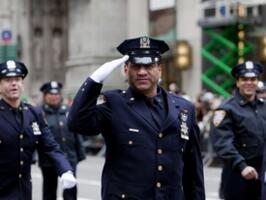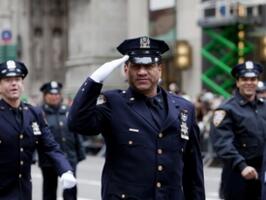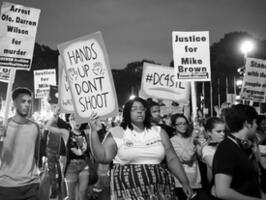Most Voters Think Media Wrong on Race Shootings, Put Police At Risk
Following the shooting last week of two police officers in Ferguson, Missouri, most voters think the media is overemphasizing shootings by the police and making their jobs more dangerous.
A new Rasmussen Reports national telephone survey finds that only 24% of Likely U.S. Voters think white police officers shooting innocent black people is a bigger problem in America today than blacks shooting each other. Sixty-two percent (62%) believe black people shooting other blacks is the bigger problem. Fourteen percent (14%) are not sure. (To see survey question wording, click here.)
But 61% think the media instead overhype incidents in which blacks are shot by white police officers. Twenty-eight percent (28%) disagree, while 11% are undecided.
Sixty-three percent (63%) say media coverage is making it more dangerous for police officers to do their jobs. Twenty-six percent (26%) don’t believe this is true. Again, 11% aren’t sure.
Fifty-four percent (54%) of Americans said last August that the media would have offered less coverage of the Michael Brown story in Ferguson if a black policeman had shot a white teenager.
(Want a free daily e-mail update? If it's in the news, it's in our polls). Rasmussen Reports updates are also available on Twitter or Facebook.
The survey of 1,000 Likely Voters was conducted on March 12 and 15, 2015 by Rasmussen Reports. The margin of sampling error is +/- 3 percentage points with a 95% level of confidence. Field work for all Rasmussen Reports surveys is conducted by Pulse Opinion Research, LLC. See methodology.
Seventy percent (70%) of voters believe the level of crime in low-income inner city communities is a bigger problem in America today than police discrimination against minorities.
Sixty-six percent (66%) of whites and 53% of other minority voters consider blacks shooting each other to be a bigger problem than white police officers shooting innocent black people. Black voters are evenly divided on this question.
Blacks are also less convinced than whites and other minorities that the media overhype incidents in which blacks are shot by white police officers. Whites and other minority voters are twice as likely as blacks to believe this media coverage is making it more dangerous for police officers to do their jobs.
This reflects the wide racial differences in perception when it comes to the police and the justice system. Eighty-two percent (82%) of black voters think most black Americans receive unfair treatment from the police. White voters by a 56% to 30% margin don’t believe that’s true. Other minority voters are evenly divided.
Eighty-four percent (84%) of blacks and 56% of other minority voters consider the U.S. justice system unfair to black and Hispanic Americans, while 54% of whites view the system as fair to these minorities.
Women and those under 40 are more likely than men and older voters to believe white police officers shooting innocent blacks is the bigger problem, but the majority of voters in nearly every demographic category see black-on-black shootings as the larger concern.
Republicans and voters not affiliated with either major political party are much more skeptical than Democrats of the media coverage of police shootings. They’re also much more likely than Democrats to think this coverage makes it more dangerous for police officers to do their job.
The U.S. Justice Department last week charged police in Ferguson with a widespread pattern of racial discrimination, prompting the police chief to resign, but few voters expect Ferguson to become any safer. Very few think the federal government is much help to local police.
But then 56% think the Justice Department is more concerned with politics than with making sure justice is done when it decides to investigate a local crime like the Brown shooting independent of the local police. Just 34% say the Justice Department is more interested in making sure justice is done, while 10% are not sure.
The Ferguson police officer who shot Brown said he was acting in self-defense. He was not indicted by a local grand jury on any charges following the Brown incident, and after several months of investigating, the Justice Department also found no grounds for charging the officer. Few Americans expected the officer to be charged with murder, and most opposed the Justice Department trying to prosecute him after that.
Sixty-seven percent (67%) of Americans rate the performance of the police in the area where they live as good or excellent, and just 13% think most deaths that involve the police are the fault of the policeman. Yet while 61% of whites and 50% of other minorities think most deaths involving the police are the fault of the suspect, just 16% of blacks feel that way. A third (33%) of black adults think the cop is usually at fault, but a sizable 51% are not sure.
Additional information from this survey and a full demographic breakdown are available to Platinum Members only.
Please sign up for the Rasmussen Reports daily e-mail update (it’s free) or follow us on Twitter or Facebook. Let us keep you up to date with the latest public opinion news.
The survey of 1,000 Likely Voters was conducted on March 12 and 15, 2015 by Rasmussen Reports. The margin of sampling error is +/- 3 percentage points with a 95% level of confidence. Field work for all Rasmussen Reports surveys is conducted by Pulse Opinion Research, LLC. See methodology.
Rasmussen Reports is a media company specializing in the collection, publication and distribution of public opinion information.
We conduct public opinion polls on a variety of topics to inform our audience on events in the news and other topics of interest. To ensure editorial control and independence, we pay for the polls ourselves and generate revenue through the sale of subscriptions, sponsorships, and advertising. Nightly polling on politics, business and lifestyle topics provides the content to update the Rasmussen Reports web site many times each day. If it's in the news, it's in our polls. Additionally, the data drives a daily update newsletter and various media outlets across the country.
Some information, including the Rasmussen Reports daily Presidential Tracking Poll and commentaries are available for free to the general public. Subscriptions are available for $4.95 a month or 34.95 a year that provide subscribers with exclusive access to more than 20 stories per week on upcoming elections, consumer confidence, and issues that affect us all. For those who are really into the numbers, Platinum Members can review demographic crosstabs and a full history of our data.
To learn more about our methodology, click here.





